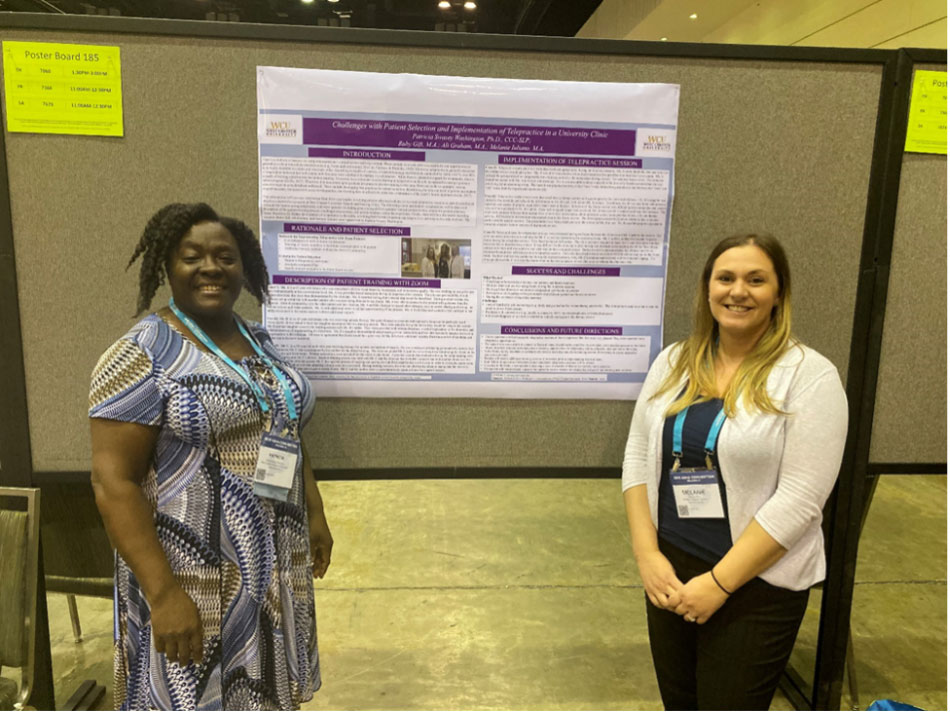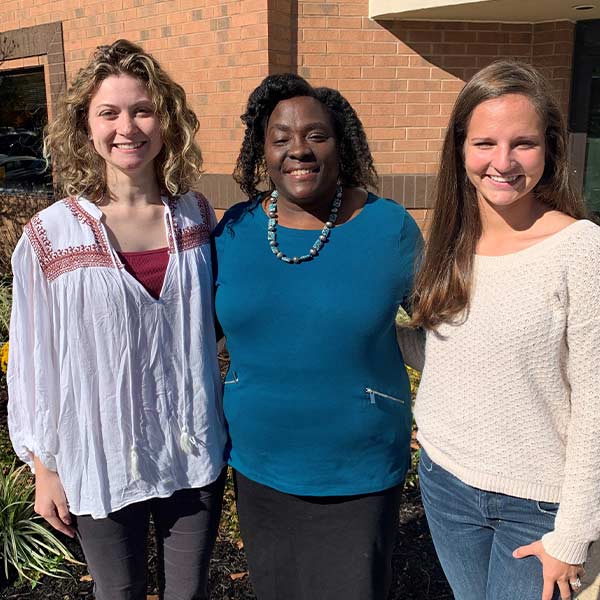Bilingual Language Lab
The mission of the Bilingual Language Lab is to serve the needs of the bilingual community for prevention, assessment, and intervention in the field of speech-language pathology. We aim to investigate and share best practices for working with bilingual children and their families from different language backgrounds, addressing variables, including oral language skills (e.g., morphosyntactic and vocabulary), early and later literacy (e.g., print awareness, letter knowledge), and parental collaboration (e.g., shared book reading using bilingual books).
Lab Personnel
Undergraduate and graduate students in the laboratory are encouraged to be involved in all phases of research including research design, recruiting study participants, testing, data transcription, data analysis, presentations, and publications.
For more information about the Bilingual Language Lab and for opportunities to collaborate, please contact the principal investigator, Dr. Patricia Swasey Washington: pswasey@wcupa.edu
Dr. Swasey Washington and former graduate assistants, Laureen Beeles and Madeline Esch
Morphosyntactic Development of Spanish-English Bilingual Children
One area of research is to examine the morphosyntactic development of Spanish-English bilingual children, the results of which will inform assessment and intervention. Results have been presented at local, state and national conferences (e.g., Krieger et al., Pennsylvania Speech-Language Association Convention, 2103, poster presentation; Swasey Washington & Iglesias, 2013, Linguistic Association of the Southwest Conference, oral presentation; Swasey Washington & Iglesias, 2012, American Speech-Language-Hearing Association Convention, poster presentation).
Cultural and Linguistic Competence
A second area of research involves assessing and increasing the cultural and linguistic competence of undergraduate and graduate students who are engaged in the Bilingual Emphasis Course Sequence (BECS) (a component of the speech-language pathology graduate program) (Swasey Washington, 2012, BECS founder and director). BECS students participate in international clinical, cultural, and classroom opportunities. Results of self-rating of confidence levels in using Spanish on various speech-language tasks showed that students felt they improved on most tasks after one semester enrolled in the BECS (Swasey Washington & Coleman, 2017, poster presentation at the Pennsylvania Speech-Language-Hearing Association (PSHA) Convention). This information is used to inform the BECS and at the same time elevate the level of services provided to the community.






![Two women posing holding the book 'If You Give a Mouse a Cookie' [in Spanish].](/healthSciences/commDisorder/images/1.4.jpg)

Interprofessional Education and Practice with Cultural and Linguistic Diversity Considerations
A third area of research is interprofessional education and practice (IPE/IPP) with cultural and linguistic diversity considerations. We have combined international interprofessional initiatives involving collaborations between West Chester University and Universidad Santa Paula (USP), Costa Rica (Swasey Washington & Arenas, poster presentation at the 2016 ASHA Convention) with IPE/IPP at WCU.
Beginning in 2015 students have been participating in the Communication Sciences and Disorders Study abroad in Costa Rica program as part of the Bilingual Emphasis Course Sequence, a component of the CSD graduate program (Swasey Washington, 2012, Program founder and director). They participate in community clinics, working with other speech-language students, teachers, and professionals to meet the needs of patients. On designated days, they also engage in cultural immersion activities and excursions. The program was implemented in the summers of 2015, 2017, 2018, and 2019. Due to the COVID-19 pandemic, the 2020 program was cancelled. The 2021 program was also cancelled for low enrollment due to continuing concerns about the COVID-19 pandemic.
In the winter of 2019, the long-awaited reciprocal visit of USP students and faculty to WCU took place, with our first international interprofessional education and practice experience (PE/IPP) in the WCU community. Professions represented by WCU students and faculty were nutrition and speech-language pathology, while USP faculty and students were from the professions of occupational therapy, physical therapy, and speech-language pathology. After IPE training and development of interprofessional screening tools for bilingual Spanish-English pediatric and adult patients, students worked in teams, supervised by faculty, to conduct screenings. They later participated in debriefing and reflection activities. This event resulted in an invited presentation (Grillo et al., Stockton University, Virtual IPE Conference, June 4, 2021).
Due to the COVID-19 pandemic, WCU cancelled international travel and moved academic and community events to a virtual mode. As a result, IPE/IPP and study abroad events involving CSD were reconstructed, to become an online, synchronous course in summer 2020 and 2021, Interprofessional Education and Cultural and Linguistic Diversity Considerations. Summer 2020 involved bilingual English-Spanish CSD students and monolingual Nutrition students. The students were provided cultural competence and IPP training, using several online modules. The clinical experience was based on elaborating case studies, team building, creating culturally responsive interprofessional screening tools, role-plays, documentation, written reflection, and debriefing. Students received summative and formative feedback.
Based on the combination of interprofessional activities involving study abroad and cultural and linguistic diversity, three presentations resulted (Swasey Washington et al., virtual presentation at the 2021 Pennsylvania Speech-Language-Hearing Convention; Swasey Washington et al., virtual presentation at the 2021 American Speech-Language-Hearing Association; Swasey Washington et al., invited oral presentation at the 2022 Pennsylvania Speech-Language Hearing Association). An article documenting our work is in progress and will be submitted for publication soon. We continue to update our course and activities to support the needs of our students and community.




Telepractice
A fourth area of research is speech-language telepractice. After I received the Speech-Language Pathology Telepractice Training at Waldo County General Hospital, Bellfast, ME in the summer of 2018, my students and I piloted telepractice sessions with several patients. The patients were provided supplemental teletherapy sessions. We presented our results at the American Speech-Language-Hearing Association (ASHA) Convention (Swasey Washington et al., 2018, poster session). This project allowed us to investigate challenges and benefits of using teletherapy with patients. The plan had been to offer virtual speech-language services to both monolingual and bilingual patients in the West Chester University Speech and Hearing Clinic, in a gradually increasing fashion. However, when COVID-19 pandemic began and continued, our clinic and other community and university clinics were thrust into a largely virtual mode of service. We continue to investigate the best ways to use telepractice to serve our community, particularly those members who have challenges with traveling (e.g., distance, ambulation).
At the height of the pandemic, I examined the best ways to engage our patients virtually, resulting in two presentations on involving young children and their families in teletherapy (Swasey Washington, 2021, ASHA Convention, poster session; Swasey Washington, 2022, National Student Speech-Language-Hearing Convention, West Chester University, oral presentation). We continue to investigate telepractice options for patients from communities experiencing healthcare disparities, including those from culturally and linguistically diverse backgrounds. Also, I launched an international virtual telepractice event as part of a virtual study abroad to Costa Rica, which provided insight into how best to involve bilingual English-Spanish students in teletherapy with Spanish-speaking children and adults (Swasey Washington et al., 2021, ASHA Convention, poster session).


